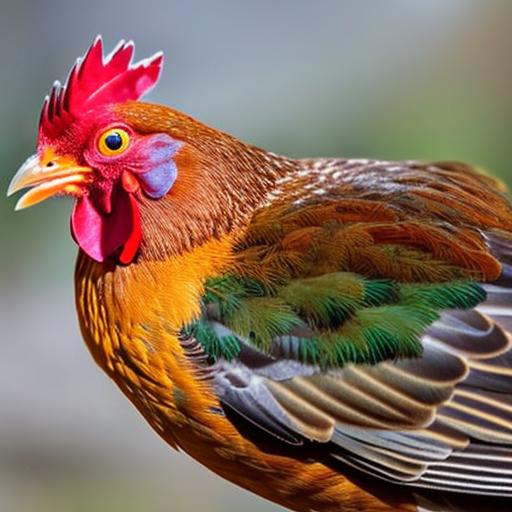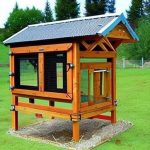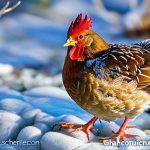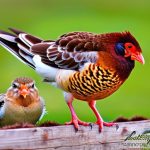Preparing chickens for winter weather is an essential part of responsible chicken ownership. As the temperatures drop and the days become shorter, it is important to ensure that your chickens are well-equipped to handle the cold. Understanding the cold-hardiness of different chicken breeds is crucial in determining how to best prepare them for winter. By taking the necessary steps to protect your chickens from the elements, provide them with adequate shelter and warmth, and adjust their nutrition accordingly, you can help ensure their health and well-being throughout the winter months.
Key Takeaways
- Different chicken breeds have varying levels of cold-hardiness
- Coops should be prepared for winter weather with insulation and draft-proofing
- Adequate shelter and protection from the elements is crucial for chicken health in winter
- Proper bedding and insulation can help keep chickens warm
- Access to fresh water must be ensured during freezing temperatures
Understanding the cold-hardiness of chicken breeds
Different chicken breeds have varying levels of cold tolerance. Some breeds are naturally more suited to colder climates and can withstand freezing temperatures, while others may struggle in colder conditions. It is important to research and understand the cold-hardiness of the specific breeds you own or plan to own.
For example, cold-hardy breeds include the Rhode Island Red, Plymouth Rock, and Wyandotte. These breeds have been bred over time to be able to withstand colder temperatures and harsher climates. On the other hand, Mediterranean breeds such as Leghorns are less cold-tolerant and may require additional protection during winter.
Preparing the coop for winter weather
Preparing the coop before winter arrives is crucial in ensuring that your chickens have a safe and comfortable environment during the colder months. One of the most important steps in winterizing the coop is sealing any drafts. Cold air drafts can cause your chickens to become chilled and can lead to health issues such as respiratory problems.
To seal drafts, you can use materials such as weatherstripping or caulk to seal any gaps or cracks in the coop walls or windows. Insulating the coop is also important in maintaining a warm environment for your chickens. Adding insulation to the walls and roof of the coop can help retain heat and keep out cold air.
Providing adequate shelter and protection from the elements
In addition to preparing the coop, it is important to provide your chickens with adequate shelter from the elements. This includes protection from wind, snow, and rain. Wind can be particularly dangerous for chickens as it can cause them to become chilled and can even lead to frostbite.
One option for providing shelter is to use tarps or windbreaks. These can be placed around the coop or in the chicken run to block wind and provide a barrier against the elements. It is important to ensure that the shelter is secure and will not blow away in strong winds.
Keeping chickens warm with proper bedding and insulation
Proper bedding and insulation are essential in keeping chickens warm during winter. Bedding not only provides insulation but also helps absorb moisture and provides a comfortable surface for your chickens to rest on. Straw and wood shavings are popular bedding options as they provide good insulation and are easy to clean.
Insulation can also be added to the floor of the coop to provide additional warmth. This can be done by placing a layer of straw or wood shavings on top of the existing floor. It is important to regularly clean and replace bedding to prevent moisture buildup and maintain a healthy environment for your chickens.
Ensuring access to fresh water during freezing temperatures

Providing access to fresh water is crucial for your chickens’ health during winter. However, freezing temperatures can cause water sources to freeze, making it difficult for chickens to stay hydrated. Dehydration can lead to health issues and decreased egg production.
To prevent water from freezing, you can use heated waterers or heated bases for traditional waterers. These devices are designed to keep the water at a temperature above freezing, ensuring that your chickens have access to fresh water at all times. It is important to regularly check these devices and ensure that they are functioning properly.
Adjusting feed and nutrition for cold weather conditions
Chickens’ nutritional needs change during winter. As the temperatures drop, chickens require more energy to stay warm. It is important to adjust their feed and nutrition accordingly to ensure that they are getting the necessary nutrients.
One way to do this is by increasing their feed ration. Providing a higher calorie feed or adding supplements such as cracked corn or black oil sunflower seeds can help provide the extra energy that chickens need during winter. It is important to monitor your chickens’ weight and adjust their feed accordingly to prevent overfeeding or underfeeding.
Monitoring for signs of frostbite and other winter health concerns
Frostbite is a common concern during winter months, especially for chickens with exposed combs and wattles. It is important to regularly monitor your chickens for signs of frostbite, such as blackened or swollen combs and wattles.
In addition to frostbite, other winter health concerns include respiratory issues and mites. Cold temperatures can exacerbate respiratory problems, so it is important to ensure that the coop is well-ventilated but draft-free. Regularly inspecting your chickens for signs of mites and treating them promptly can help prevent infestations.
Implementing safe heating methods for the coop
While it may be tempting to use unsafe heating methods in the coop, such as heat lamps, it is important to prioritize safety. Heat lamps can be a fire hazard and can cause burns or injuries to your chickens if not used properly.
If you choose to use a heat source in the coop, it is important to use safe heating methods. This includes using a heater specifically designed for use in chicken coops and following the manufacturer’s instructions. It is also important to regularly inspect the heater and ensure that it is functioning properly.
Managing egg production during winter months
Egg production naturally decreases during winter due to shorter daylight hours. However, there are steps you can take to manage egg production during this time. Providing supplemental lighting in the coop can help stimulate egg production.
Using a timer, you can set the lights to turn on early in the morning and stay on for a few hours after sunset. This will help mimic longer daylight hours and encourage your chickens to continue laying eggs. It is important to gradually adjust the lighting schedule to prevent stress or disruption to your chickens’ natural rhythms.
Preparing for potential winter storms and power outages
Preparing for potential winter storms and power outages is crucial in ensuring the safety and well-being of your chickens. Winter storms can cause power outages, which can leave your chickens without heat or access to fresh water.
Having a backup power source, such as a generator or battery-powered heater, can help ensure that your chickens have access to heat and fresh water during power outages. It is also important to have a plan in place for sheltering your chickens during severe weather events.
Preparing chickens for winter weather is essential in ensuring their health and well-being during the colder months. By understanding the cold-hardiness of different chicken breeds, preparing the coop, providing adequate shelter and warmth, adjusting feed and nutrition, monitoring for health concerns, implementing safe heating methods, managing egg production, and preparing for potential winter storms and power outages, you can help keep your chickens safe and healthy throughout winter. Taking these necessary steps will not only ensure the comfort of your chickens but also contribute to their overall productivity and longevity.
If you’re wondering about keeping chickens outside in winter, you may also be interested in learning how to care for goslings. Goslings require special attention and care, especially during their early stages of development. Poultry Wizard has a helpful article on how to care for goslings, providing valuable insights and tips to ensure their well-being. Check out the article here to learn more about raising healthy and happy goslings.
FAQs
Can chickens survive outside in winter?
Yes, chickens can survive outside in winter as long as they have proper shelter, food, and water.
What kind of shelter do chickens need in winter?
Chickens need a dry and draft-free coop with good insulation to keep them warm in winter. The coop should also have good ventilation to prevent moisture buildup.
What should I feed my chickens in winter?
Chickens need a balanced diet of protein, carbohydrates, and fats in winter. You can feed them a combination of commercial feed, scratch grains, and fresh vegetables.
How often should I check on my chickens in winter?
You should check on your chickens at least twice a day in winter to make sure they have enough food and water and that their coop is warm and dry.
What are some common health problems that chickens face in winter?
Chickens are susceptible to respiratory infections, frostbite, and dehydration in winter. You should take steps to prevent these problems by keeping their coop clean and dry, providing them with fresh water, and protecting their combs and wattles from the cold.
Can I keep my chickens outside all winter?
Yes, you can keep your chickens outside all winter as long as you provide them with proper shelter, food, and water. However, some chicken owners choose to bring their chickens inside during extreme cold weather.
Meet Walter, the feathered-friend fanatic of Florida! Nestled in the sunshine state, Walter struts through life with his feathered companions, clucking his way to happiness. With a coop that’s fancier than a five-star hotel, he’s the Don Juan of the chicken world. When he’s not teaching his hens to do the cha-cha, you’ll find him in a heated debate with his prized rooster, Sir Clucks-a-Lot. Walter’s poultry passion is no yolk; he’s the sunny-side-up guy you never knew you needed in your flock of friends!







